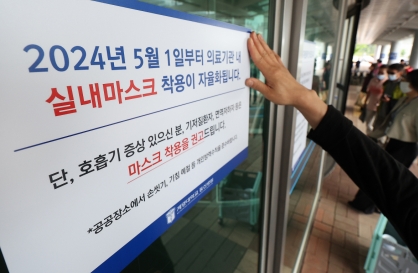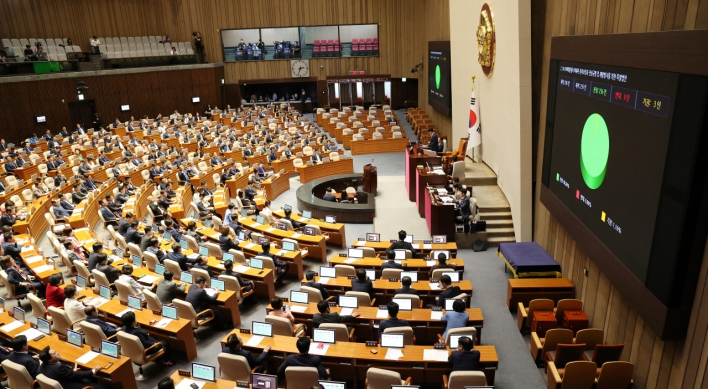S. Korea faces dilemma between carbon neutrality, anti-nuclear policy
New industry minister remains elusive on nuclear policy
By Kim Byung-wookPublished : June 8, 2021 - 15:53

Minister of Trade, Industry and Energy Moon Sung-wook said Tuesday that the ministry will lead South Korea’s carbon neutrality plan, but remained vague on whether the plan includes nuclear energy.
At his first press conference since taking office early last month, Moon stressed that the industrial sector emits 37 percent of the nation’s total carbon output and therefore the Industry Ministry should step up its efforts to help the country go carbon neutral by 2050.
Asked whether the government is willing to reconsider its earlier pledge to phase out nuclear energy to aid the decarbonization drive by granting life extensions to aging nuclear power plants or restarting retired ones to seek carbon neutrality as witnessed in Japan and the US, the minister did not provide a clear answer.
“Our nuclear power plants are designed with maximum safety, but there are views whether it’s the right thing to build new ones … considering that nuclear power plants are concentrated in densely populated areas in the country’s southeastern region,” Moon said at the government office complex in Sejong.
While some advanced countries are looking anew at the role of nuclear energy in the low-carbon economy, South Korea is sticking to its anti-nuclear policy, in tune with President Moon Jae-in’s election pledge. Nuclear energy’s carbon footprint is as low as solar or wind power, studies have shown.
During the Moon administration, the country has scrapped plans to construct six new nuclear power plants, banned the life extensions of aging ones and even ordered the early closure of the Wolsong-1 nuclear reactor, which was decommissioned in 2019 after 37 years of operation.
On the contrary, Japan in April approved the restart of three retired nuclear reactors more than 40 years old to meet climate goals. Last month, the US granted a life extension to 80 years for two nuclear reactors in Virginia. The US now has six nuclear reactors that can operate until they are 80 years old.
Asked how the government will revive the domestic nuclear power plant industry dampened by President Moon’s nuclear phase-out policy, the minister said the country will launch active export efforts to keep the ecosystem alive.
The ministry is pinning hopes on a nuclear power plant project in Dukovany, Czech Republic. Local companies are vying with more established players from the US and France to win the contract.
In 2016, one year before President Moon took office, the domestic nuclear power plant industry generated 27.4 trillion won ($24.5 billion) in revenue. Three years later, the figure shrank to 20.7 trillion won. Doosan Heavy Industries & Construction, Korea‘s only major equipment supplier for nuclear power plants, saw its operating profit plunge from 203.5 billion won to 62.9 billion won in the same period, and has undergone massive layoffs.
During the South Korea-US summit last month, two countries agreed to broaden cooperation in the nuclear energy sector to target overseas markets.
Above all, the industry minister hinted that even if Korea successfully develops a small modular reactor -- a next-generation reactor smaller than conventional ones -- the country would not build it on the mainland.
“Korea is in the process of securing technologies for SMRs, but it will take a lot of time. Before adding SMRs at the current safety level, we must consider that there are already too many nuclear reactors compared to the size of the country. Also, there is a public acceptance issue,” the minister said.
By Kim Byung-wook (kbw@heraldcorp.com)




![[Music in drama] Rekindle a love that slipped through your fingers](http://res.heraldm.com/phpwas/restmb_idxmake.php?idx=644&simg=/content/image/2024/05/01/20240501050484_0.jpg&u=20240501151646)

![[New faces of Assembly] Architect behind ‘audacious initiative’ believes in denuclearized North Korea](http://res.heraldm.com/phpwas/restmb_idxmake.php?idx=644&simg=/content/image/2024/05/01/20240501050627_0.jpg&u=20240502093000)


![[KH Explains] Will alternative trading platform shake up Korean stock market?](http://res.heraldm.com/phpwas/restmb_idxmake.php?idx=644&simg=/content/image/2024/05/01/20240501050557_0.jpg&u=20240501161906)








